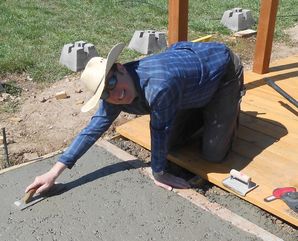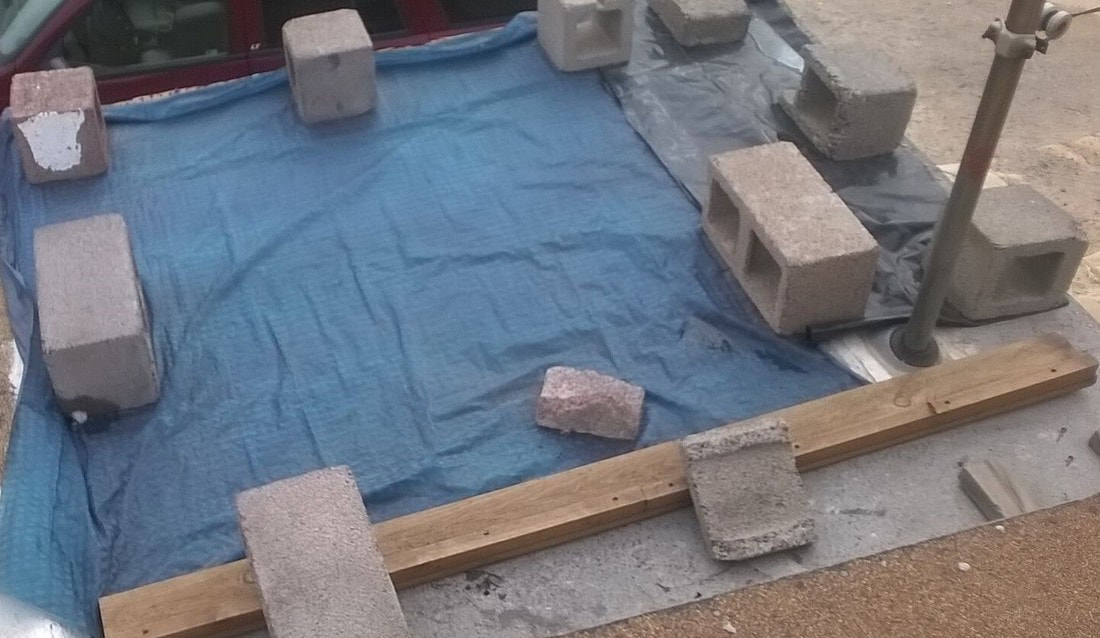 It’s been a busy spring and summer for Red Feather. We’ve been making a meaningful impact with our case management program, the Native Home Resource Network. The program attempts to help families with their housing needs, leveraging as many resources as possible that exist within the family and community before supplementing those with resources Red Feather and its network can locate outside the community. Please read Joe’s articles about some of the successes we are seeing with this program and others. This Memorial Day we took a small break from helping with housing to join our partner, Western Navajo Agency Veterans Administration, hosting an event to honor departed veterans. Native Americans have the highest percentage of people serving in the military - more than any other ethnic group in the United States. This is partly because of lack of jobs in their communities, but also because of their strong warrior traditions. There is a tremendous amount of respect and honor bestowed upon those that are willing to sacrifice their own lives for others. Thanks to a grant from APS, material donations from Home Depot, and labor and planning support from a group of Honor Riders and other members of the Tuba City community, we repainted the exterior of the Veterans office, spruced up the surrounding area, and hosted a memorial ceremony and lunch for Veterans and their families. The ceremony that began with a sunrise prayer and raising of flags, included over 200 names of deceased Veterans being added to a memorial wall. It was a day filled with emotional speeches. Tears could be seen on even the most stoic faces. With so many from these Native communities making the ultimate sacrifice - for us -it gives me even greater resolve to help with their urgent housing needs. My hope by sharing this is that it will compel you to ask yourself what more you can do. Would you consider putting Red Feather in your estate plans? If you are interested in discussing this, please don’t hesitate to contact me. Sincerely, Mark Hall
Executive Director 928-440-5119 By Joe Seidenberg Red Feather's Native Home Resource Network (NHRN) links homeowners with resources to address critical health and safety housing needs. Sometimes this is as simple as providing a referral to existing resources like assistance with an energy bill and other times it involves many hours of dedicated case management to resolve more complex health and safety repairs.
Recently, Red Feather has been assisting Jeanette Sahneyah, a Hopi Tribal elder from the Village of Shungopavi, to identify the resources needed to implement critical roofing repairs and mold mitigation on her home. To date, we have been able to develop project plans, identify contractors, secure a $7,500 grant from the USDA, and obtain an environmental health assessment from U.S. Indian Health Services. Additionally, we have another $6,000 available from Arizona Public Service to weatherize the home once the roof has been repaired. However, despite all the resources and progress amassed so far, we still need additional funds to complete the project as planned. This is why we recently launched a crowdfunding campaign to leverage the power of individual giving. We have found that private foundations generally do not fund direct housing repairs due to a preference for focusing on systemic issues of poverty and community development, such as Red Feather’s DIY Educational Programs. While addressing systemic issues is an important focus area, it also ignores the fact that many families need immediate assistance with health and safety issues in their homes. And while most tribal housing authorities are doing all they can to help, they often cannot meet the overwhelming demand for their services. Just as there is a Red Cross to help families and communities with disasters there needs to be services that are responding to emergency housing repair needs. Our hope for the sustainability of this strategy is to build a large enough network that continues to grow. If even a few people are supportive of this effort and in-turn share with their network we are moving in the right direction.  With an over 20 -year history of helping people help themselves, Red Feather has seen difficult times and has always overcome them. We have been able to sustain our programs by listening carefully to the communities we serve and leveraging the wisdom of our large family of donors, partners, board members and advisors. A new challenge presented itself when our recent annual appeal earned only half of what we were expecting. To determine our path forward, four Red Feather board members, the five Red Feather staff members, and a seasoned facilitator came together. Through those conversations, we collectively concluded that our existing assets and expected income would not support our current operating structure, and that changes were necessary to ensure the survival of the organization. Consequently, the Board and I decided to suspend operations in Montana where we have been working with the Northern Cheyenne Tribe, until funding conditions are more favorable. In agriculture, there are times when planting fewer crops is necessary to save seeds for more favorable growing conditions. A similar principle applies in organizational management – difficult prioritization decisions are often required to ensure a healthy future. It is very difficult to discontinue our programs serving the Northern Cheyenne people, and to lose a valuable member of the Red Feather team in John Marian, but we felt strongly that this was the best way to ensure our programs endure to help others, and to hasten our return to Montana. John Marian has served as Red Feather’s Education Director and Northern Plains Program Manager since 2014. He originally joined the organization in 2012 as a part-time temporary employee, hired specifically to develop our first educational curriculum, a Basic Home Maintenance college course which he successfully delivered at Chief Dull Knife College in 2013. Since that time, John has been responsible for creating all of Red Feather’s highly successful Do-It-Yourself educational programs, empowering Native Americans to address their most urgent housing needs. In addition, John has developed and delivered several other important programs with and for the Northern Cheyenne people; such as healthy home maintenance workshops for low-rent tenants, a building performance study which included several Red Feather straw bale homes and led to a major home renovation project for Northern Cheyenne elder and veteran Bilford Curley, and, most recently, a volunteer-driven Weatherization Blitz. While difficult to part ways with John, we are grateful for the time and devotion he gave to the Northern Cheyenne people and to Red Feather, and expect great things from whatever he undertakes next. We ask the Northern Cheyenne people, and all of our supporters and followers, to please be patient. We must strengthen ourselves before helping others. By focusing our remaining resources on the programs we offer to the Navajo Nation and Hopi Tribe we will grow strong enough to return to plant the seeds we have set aside. We will continue to maintain a smaller office and storage in Bozeman, and thankfully retain our Office Manager, Delisa de Vargas and our VISTA worker Ellary Kramka. We remember the Northern Cheyenne and are grateful for the faith they have shown us and the opportunities they have provided for us to become better people. It is with this in mind, that we store the seeds that will allow us to return our programs to the Northern Cheyenne people. |
Archives
June 2023
Categories
All
|
|
Change your mind at any time by clicking 'unsubscribe' in any email you receive or by contacting us at info@redfeather.org. We will treat your information with respect. For more information about our privacy practices please see our privacy policy. By clicking above, you agree that we may process your information in accordance with these terms.
In compliance with all GDPR requirements- you can request any data you’ve shared with Red Feather to be permanently deleted from our records by contacting us at info@redfeather.org. |
WORKING WITH HOPI AND DINÉ
COMMUNITIES FOR HEALTHIER AND SAFER HOMES.
LAND ACKNOWLEDGEMENT: The Red Feather program office sits in an area that is sacred to over 14 local tribes, including the Diné, Hopi, Havasupai, Hualapai, Zuni, Pueblo, and Kaibab-Paiute peoples. Some of these nations are represented among the Red Feather staff, and some not. We humbly acknowledge this area’s Indigenous nations, original stewards and Native descendants who will forever know this place as home. We share a responsibility to recognize and acknowledge the people, cultures, and histories that make up our community. *Adapted from the Flagstaff City Council land acknowledgement developed by the Indigenous Commission

If you have a disability that limits your ability to access our facilities, please contact us so we can arrange for an alternative meeting location. See our ADA access plan here.
This institution is an equal opportunity provider. |




 RSS Feed
RSS Feed


